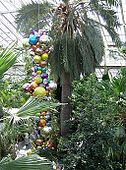Jubaea
| Chilean wine palm | |
|---|---|

| |
| Scientific classification | |
| Kingdom: | Plantae |
| Clade: | Tracheophytes |
| Clade: | Angiosperms |
| Clade: | Monocots |
| Clade: | Commelinids |
| Order: | Arecales |
| Family: | Arecaceae |
| Subfamily: | Arecoideae |
| Tribe: | Cocoseae |
| Genus: | Jubaea Kunth |
| Species: | J. chilensis
|
| Binomial name | |
| Jubaea chilensis | |
| Synonyms[2] | |
| |
Jubaea is a genus of palms with one species, Jubaea chilensis or Jubaea spectabilis, commonly known in English as the "Chilean wine palm" or "Chile cocopalm", and "coquito" in Spanish. It is native to southwestern South America and is endemic to a small area of central Chile between 32°S and 35°S in southern Coquimbo, Valparaíso, Santiago, O'Higgins, and northern Maule regions.
It has long been assumed that the extinct palm tree of Easter Island belonged to this genus as well; however, in 2008, John Dransfield controversially placed it in its own genus, Paschalococos.
Growth
The thickest well-documented Jubaea was on the estate of J. Harrison Wright in Riverside, California. Its diameter "at shoulder height" was 66 inches (1.7 m).[3] The largest of several specimens at the Adelaide (South Australia) Botanic Garden in 1889 was stated to be 6 feet (1.8 m) thick at the base.[4] A hollow (but living) Jubaea in the Ocoa Valley near La Campana National Park, Chile is 6 to 7 feet (1.8 to 2.1 m) thick at its base, with no apparent taper in the lower trunk.[5] The largest individual specimen of indoor plant in the world was the Jubaea chilensis at Kew Gardens, which was cut off by staff in 2014 because it grew to the top of its greenhouse.[6] Of the more than 2,600 known species of palms, Jubaea chilensis is the second most massive, exceeded only by the floodplain or river bottom variety of Borassus aethiopum.[7]
Conservation
The species is partially protected within Chile, although pressures of human overpopulation and expansion of grazing areas have reduced the population of the Chilean Wine Palm in recent centuries.[8]
Gallery
-
Fruits and nuts
-
World-record Jubaea at Kew Gardens
-
Jubaea chilensis in Leverkusen, Germany
-
Jubaea chilensis growing in Goleta, California
-
Painting of a Jubaea by Chilean artist Onofre Jarpa
See also
Notes
- ^ Gonzalez. 1998
- ^ "Jubaea chilensis (Molina) Baill". Plants of the World Online. Royal Botanic Gardens, Kew. Retrieved 2019-06-25.
- ^ Principes Vol. 1 # 2 (January 1957) p. 57.
- ^ James H. Veitch in Gardener's Chronicle Vol. 6 (third series) (October 5, 1889) p. 384.
- ^ Chris Caradine, "A Day in Ocoa", THE PALM JOURNAL # 143 (November 1998) P. 20 with photo.
- ^ http://www.growingontheedge.net/viewtopic.php?p=89398
- ^ Dr. Al C. Carder, GIANT TREES OF WESTERN AMERICA AND THE WORLD, (Madeira Park, British Columbia, Canada: Harbour Publishing, 2005) p. 130.
- ^ C. Michael Hogan. 2008
References
- C. Donoso (2005) Árboles nativos de Chile. Guía de reconocimiento. Edición 4. Marisa Cuneo Ediciones, Valdivia, Chile. 136p
- González (1998). "Jubaea chilensis". IUCN Red List of Threatened Species. 1998. Retrieved 11 May 2006.
{{cite journal}}: Invalid|ref=harv(help) Listed as Vulnerable (VU A1cd v2.3) - Information from Encyclopedia of Chilean Flora
- C. Michael Hogan (2008) Chilean Wine Palm: Jubaea chilensis, GlobalTwitcher.com, ed. Nicklas Stromberg
External links
- Jubaea chilensis species profile from Royal Botanic Gardens, Kew
- Floridata: Jubaea chilensis; description and places in Europe where it has been introduced
- Philip W. Rundel (2002) The Chilean Wine Palm
- Palm & Cycad Society of Australia: Jubaea chilensis
- IUCN Red List vulnerable species
- Cocoseae
- Monotypic Arecaceae genera
- Flora of central Chile
- Trees of Chile
- Chilean Matorral
- Trees of Mediterranean climate
- Vulnerable flora of South America
- Garden plants of South America
- Ornamental trees
- Drought-tolerant trees
- Taxa named by Henri Ernest Baillon
- Taxa named by Juan Ignacio Molina






